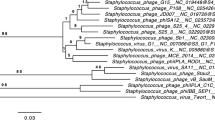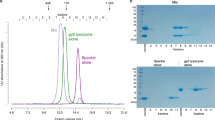Abstract
IT has been known for some time that the sensitivity of bacteria to lysis by bacteriophage is conditioned among other things by the presence of lysogenic infection with one or more bacteriophages. Various workers1–3 have shown that when sensitive cultures were lysogenically infected with typing or even unrelated phages they undergo a change of phage type, the change being a diminution in the number of phages capable of lysing the bacterial cell.
This is a preview of subscription content, access via your institution
Access options
Subscribe to this journal
Receive 51 print issues and online access
$199.00 per year
only $3.90 per issue
Buy this article
- Purchase on Springer Link
- Instant access to full article PDF
Prices may be subject to local taxes which are calculated during checkout
Similar content being viewed by others
References
Smith, H. W., J. Hyg., 46, 74 (1948).
Nicolle, P., and Hamon, P., Ann. Inst. Pasteur, 81, 614 (1951).
Anderson, E. S., and Felix, A., J. Gen. Microbiol., 9, 65 (1953).
Gorrill, R. H., and Gray, R. A., J. Gen. Microbiol, 14, 167 (1956).
Bertani, G., Cold Spring Harb. Symp. Quant. Biol., 18, 65 (1953).
Author information
Authors and Affiliations
Rights and permissions
About this article
Cite this article
GORRILL, R. Effect of Superinfection on Phage Sensitivity in Staphylococci. Nature 178, 91–92 (1956). https://doi.org/10.1038/178091b0
Issue Date:
DOI: https://doi.org/10.1038/178091b0
This article is cited by
-
Natural and artificial lysogeny of strains ofStaphylococcus aureus
Československá Mikrobiologie (1958)
Comments
By submitting a comment you agree to abide by our Terms and Community Guidelines. If you find something abusive or that does not comply with our terms or guidelines please flag it as inappropriate.



